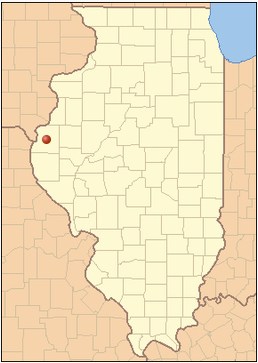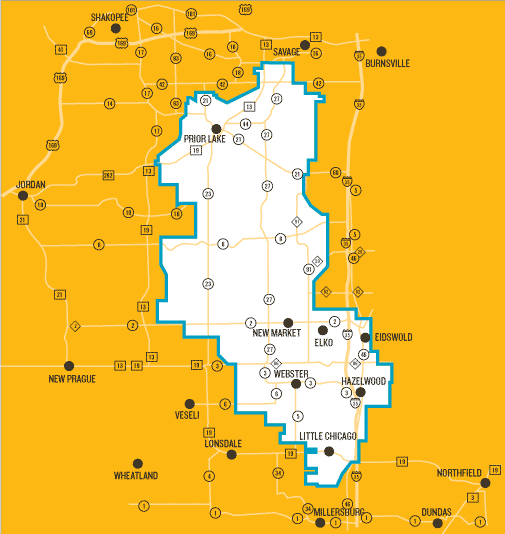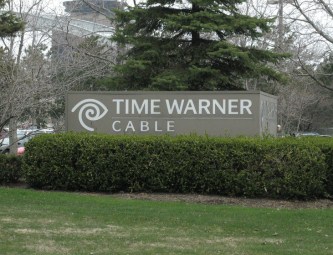Jesse and his nearby neighbors on the west side of Milton are frustrated. They live just 20 minutes away from Burlington, the largest city in the state of Vermont. Despite the proximity to a city with nearly 40,000 residents, there is no cell phone coverage in western Milton, no cable television service, and no DSL service from FairPoint Communications. For this part of Milton, it’s living living in 1990, where dial-up service was one’s gateway to the Internet.
Jesse and his immediate neighbors haven’t given up searching for broadband service options, but they face a united front of intransigent operators who refuse to make the investment to extend service down his well-populated street.
“After many calls to Comcast, they eventually sent us an estimate for over $17,000 to bring service to us, despite being less than a mile from their nearest station,” Jesse tells Vermont Public Radio. “They also made it very clear that there was no plan at any point in the future, 2010 or beyond, to come here unless we paid them the money.”
Jesse and his neighbors want to give Comcast money, but not $17,000.
For at least 15 percent of Vermonters, Jesse’s story is their story. Broadband simply remains elusive and out of reach.
Three years ago, Vermont’s Republican governor Jim Douglas announced the state would achieve 100 percent broadband coverage by 2010, making Vermont the nation’s first “e-State.”
Vermont Public Radio reviewed the progress Vermont is making towards becoming America’s first e-State. (January 20, 2010) (30 minutes)
You must remain on this page to hear the clip, or you can download the clip and listen later.
<
p style=”text-align: center;”>
In June 2007 the state passed Act 79, legislation that established the Vermont Telecommunications Authority to facilitate the establishment and delivery of mobile phone and Internet access infrastructure and services for residents and businesses throughout Vermont.
The VTA, under the early leadership of Bill Shuttleworth, a former Verizon Communications senior manager, launched a modest broadband grant program to incrementally expand broadband access, often through existing service providers who agreed to use the money to extend service to unserved neighborhoods.
The Authority also acts as a clearinghouse for coordinating information about broadband projects across the state, although it doesn’t have any authority over those projects. Lately, the VTA has been backing Google’s “Think Big With a Gig” Initiative, except it promotes the state as a great choice for fiber, not just one or two communities within Vermont.
[flv width=”480″ height=”290″]http://www.phillipdampier.com/video/Google Fiber Vermont 3-22-10.mp4[/flv]
Vermont used this video to promote their bid to become a Google Fiber state. (2 minutes)
Some of the most dramatic expansion plans come from the East Central Vermont Community Fiber Network. ECFiber, a group of 22 local municipalities, in partnership with ValleyNet, a Vermont non-profit organization, is planning to implement a high-capacity fiber-optic network capable of serving 100% of homes and businesses in participating towns with Internet, telephone and cable television service. In 2008, the group coalesced around a proposal to construct a major fiber-to-the-home project to extend broadband across areas that often don’t even have slower speed DSL.
The ECFiber project brought communities together to provide the kind of broadband service private companies refused to provide. Vermont Public Radio explores the project and the enthusiasm of residents hopeful they will finally be able to get broadband service. (March 8, 2008) (24 minutes)
You must remain on this page to hear the clip, or you can download the clip and listen later.
<
p style=”text-align: center;”>
The Vermont towns, which together number roughly 55,000 residents, decided to build their own network after FairPoint Communications and local cable companies refused to extend the reach of their services. Providers claim expanding service is not financially viable. For residents like sheep farmer Marian White, interviewed by The Wall Street Journal, that means another year of paying $60 a month for satellite fraudband, the speed and consumption-limited satellite Internet service.
White calls the satellite service unreliable, especially in winter when snow accumulates on the dish. Unlike many broadband users who vegetate for hours browsing the web, White actually gets an exercise routine while trying to get her satellite service to work.
“I open a window and I take a pan of water and, a cup at a time, I launch warm water at the satellite dish until I have melted all the snow off the dish,” Ms. White says. “It works.”
Other residents treat accessing the Internet the same way rural Americans plan a trip into town to buy supplies.
Kathi Terami from Tunbridge makes a list of things to do online and then, once a week, travels into town to visit the local public library which has a high speed connection. Terami downloads Sesame Street podcasts for her children, watches YouTube links sent by her sister, and tries to download whatever she thinks she might want to see or use over the coming week.
A fiber to the home network like ECFiber would change everything for small town Vermonters. The implications are enormous according to project manager Tim Nulty.
“People are truly afraid their communities are going to die if they aren’t on the communications medium that drives the country culturally and economically,” he says. “It’s one of the most intensely felt political issues in Vermont after health care.”
Despite the plan’s good intentions, one obstacle after another has prevented ECFiber from making much headway:
- The VTA rejected the proposal in 2008, calling it unfeasible;
- Plans over the summer and fall of 2008 to approach big national investment banks ran head-on into the sub-prime mortgage collapse, which caused banks to stop lending;
- An alternative plan to build the network with public debt financing, using smaller investors, collapsed along with Lehman Brothers on September 14, 2008;
- An attempt by Senator Pat Leahy (D-Vermont) to insert federal loan guarantees into the stimulus bill in February 2009 was thwarted by partisan wrangling;
- Attempts to secure federal broadband grant stimulus funding has been rejected by the Commerce Department;
- Opposition to the plan and objections over its funding come from incumbent providers like FairPoint, who claim the project is unnecessary because they will provide service in those areas… eventually.
For the indefinite future, it appears Ms. White will continue to throw warm cups of water out the window on cold winter mornings.
Vermont Edition takes a comprehensive look at where the state stands in broadband and wireless deployment. (April 8, 2009) (46 minutes)
You must remain on this page to hear the clip, or you can download the clip and listen later.
<
p style=”text-align: center;”>
For every Tunbridge resident with a story about life without broadband, there are many more across Vermont living with hit or miss Internet access.
Take Marie from Middlesex.

Most residents in more rural areas of Vermont get service where they can from FairPoint Communications
“I am in Middlesex, about a half-mile off Route 2, and five minutes from the Capitol Building. Yet up until just recently, we had no sign of high-speed Internet. I understand that my neighbors just received DSL a few weeks ago, but when I call FairPoint, they tell me it’s still not available at my house, which is a few hundred yards up the hill. Hopefully, they’re wrong and I’ll see DSL soon,” she says.
Marie is pining for yesterday’s broadband technology — FairPoint’s 1.5Mbps basic DSL service, now considered below the proposed minimum speeds to qualify for “broadband” in the National Broadband Plan. For Marie, it’s better than nothing.
Geryll in Goshen also lacks DSL and probably wouldn’t want it from FairPoint anyway.
“We have barely reliable landline service. A tech is at my house at least three times per year. I was told the lines are so old they are decaying. Using dial-up is impossible. I use satellite which is very expensive and is in my opinion only one step up from dial-up. I am limited to downloads and penalized if I reach my daily limit,” he says.
Many Vermonters acknowledge Douglas’ planned 100-percent-broadband-coverage-by-2010 won’t come close to achievement and many are highly skeptical they will ever see the day where every resident who wants broadband service can get it.
Chip in Cabot is among them, jaded after six years of arguments with FairPoint Communications and its predecessor Verizon about obtaining access to DSL. It took a cooperative FairPoint engineer outside of the business office to finally get Chip service. His neighbors were not so lucky, most emphatically rejected for DSL service from an intransigent FairPoint:
“I laughed when Governor Douglas announced his e-State goal “by 2010” three years ago. Now I’m thinking I should have made some bets on this claim. It took years of legal battles and a zoning variance to obtain partial cell coverage here in Cabot. Large parts of the town still do not have any cell coverage. Governor Douglas can perhaps be forgiven – he has no technical knowledge, and as a politician would be expected to be wildly optimistic about such “e-State” claims. The Vermont Telecommunications Authority and the Department of Public Service should know better however. We’re talking about rural areas where there is no financial incentive to provide either DSL or cell service. It will take a huge amount of money to provide service to those remaining parts of the state. I’m not optimistic.”
[flv width=”512″ height=”308″]http://www.phillipdampier.com/video/Wall Street Journal Vermont Broadband Problems 03-02-09.flv[/flv]
The Wall Street Journal chronicled the challenges Vermonters face when broadband is unavailable to them. ECFiber may solve these problems. Some of the stories in our article are reflected in this well-done video. (3/2/2009 — 4 Minutes)


 Subscribe
Subscribe


















